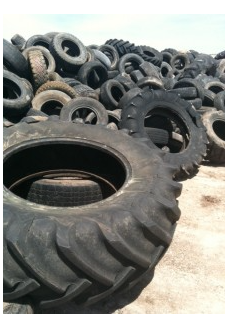By Minami Levonowich
KU Statehouse Wire
 TOPEKA – Legislators are debating a bill that would abolish the solid waste grants advisory committee, the group that specializes in clean up of tire stockpiles and market development for recycled tires. And lawmakers are talking about a reduction in the tax on tires.
TOPEKA – Legislators are debating a bill that would abolish the solid waste grants advisory committee, the group that specializes in clean up of tire stockpiles and market development for recycled tires. And lawmakers are talking about a reduction in the tax on tires.
Lawmakers want to eliminate the waste tire grant program, which has provided economic and safety benefits to Kansas residents, such as safe, clean playgrounds and parks. Lawmakers also are discussing a reduction in the tax on new tires, from 25 cents to 15 cents per tire.
Opponents say the bill could negatively impact public safety and create future economic burdens, such as damaging property values if clean-ups are not fully funded. However, proponents say it’s time to let private industry manage tire recycling.
Gary Mason, deputy secretary for environment at the Kansas Department of Health and Environment (KDHE), told the House Energy and Environment Committee on Monday that removing the funding for used tire recycling grants will not harm the state. The U.S. market has improved its management of waste tires, he said.
Before 1980, many states, including Kansas, encountered a problem with improper handling of discarded tires. Rubber scraps were left in ditches, ravines, creek beds, farmlands, and the tire fire piles. Tire dumps are not as prevalent today, Mason said, and several tire recycling businesses in Kansas are devoted to managing waste tires.
Over the years, KDHE initiated and helped make many grant programs a success, but once each program’s goals were achieved, KDHE closed the program.
“We funded the (programs) heavily in the early years to get that momentum going … and now those grants essentially don’t exist. We did the same with many of the recycling grants on solid waste recycling landfills to where those are down to very little opportunities now,” Mason said. “That’s just what our trend is. . . . We try to move the bar. Once we move it, we kind of back out of the program and let the private sectors and others pick it up.”
KDHE disposed of more than 11 million tires from 1993 to 2001. In the last eight years, the agency has noted a 99 percent reduction in the amount of tires collected each year.
The 25-cent tire tax generates approximately $712,000 per year in revenue, Mason said. Those revenues funded 50 percent of grant program’s administration costs, as well as the cost of waste tire removals.
Opponents argued that removing the waste tire grant program, which encourage the purchase of recycled tire products, will reduce benefits to schools and local governments. Also, it will harm the state’s ability to recycle abandoned tires and discourage the growth of local industries, they said.
Justin Glasgow, owner of Performance Tire and Wheel in Topeka and board member of the Mid-America Tire Dealers Association (MATDA), told the committee that taking away a program that is user-generated and self-funded and that shares money with schools and other facilities is a mistake, especially since consumers don’t dispute paying the small tax after spending more than $100 on a tire.
Gary Champlin, general manager of Champlin Tire Recycling, Inc., in Concordia and national secretary/treasurer at the Institute of Scrap Recycling Industries, said that Kansas already has the lowest tax in the nation for the purchase of new tires.
Spencer Duncan, executive director of the Kansas Organization of Recyclers (KOR), said that the waste tire grants allowed private and public entities such as schools, churches, and parks to provide safe and clean surfaces for citizens. Despite KOR’s good relations with KDHE, Duncan disagrees with them on this issue.
“They’re telling you this has been such a successful program, it’s time for it to go away,” Duncan said. “We’re arguing that it’s such a successful program, you should be trumpeting from the mountaintops about what a great thing this has been for such a low fee.”
KDHE stated in the Scrap Tire News in January that the tire recycling grant program “ended” even though the statute required it to continue. Democratic Rep. John Carmichael, D-Wichita, said he was “interested in fixing the blame” on KDHE and wanted to know who was responsible for suspending this program without speaking with legislators. Mason admitted there was miscommunication within the agency.
“The (KDHE) website says ‘suspended,’ this (publication) says ‘ends.’ We’ve got some internal communication issues, and I’ll take full blame for it,” Mason said. “I don’t think that (miscommunication) was the intent, but we obviously have a law that we have to abide by and we intend on doing that.”
Edited by Madeline Mikinski
